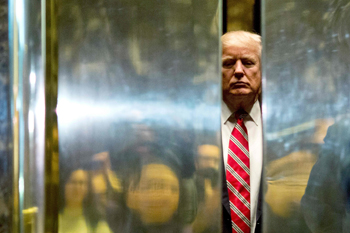District of Columbia, Jan 18: US President-elect Donald Trump takes office this week with dismal approval and popularity numbers, according to polls out Tuesday, underscoring the deep divisions among Americans as the New York businessman prepares for his inauguration.

A CNN/ORC poll showed 40 percent of respondents approved of the way Trump has been handling the transition period heading into Friday`s inauguration, a figure that`s sharply lower than any incoming US president in recent history.
Trump will enter the Oval Office as the least popular incoming president in at least four decades, according to a Washington Post-ABC News poll.
The president-elect immediately slammed the findings, pointing out that a majority of surveys ahead of his November 8 electoral win predicted victory for his Democratic opponent Hillary Clinton.
"The same people who did the phony election polls, and were so wrong, are now doing approval rating polls. They are rigged just like before," he said on Twitter.
The real estate developer who is working in government for the first time has presided over a chaotic and unorthodox transition period since his election.
The recent weeks have featured -- among other things -- a drawn-out search for top cabinet members, questions over conflicts of interest, feuds with the media, unsubstantiated allegations that Russia holds compromising material against Trump, and the president-elect`s Twitter blasts against critics ranging from the CIA chief to the screen legend Meryl Streep.
The CNN poll showed Trump lagging more than 20 points behind the approval ratings of his three most recent predecessors and 44 points below that of President Barack Obama as he prepared to enter the Oval Office in 2009.
Obama had an 84 percent approval rating ahead of his inauguration, Bill Clinton scored 67 percent approval in late December 1992 and 61 percent approved of George W. Bush`s transition in poll figures from January 2001, CNN said.
Forty percent of respondents told the Washington Post-ABC survey they have a favorable impression of the incoming president, compared with 54 percent who said they have an unfavorable impression.
That makes Trump the most unpopular incoming president since at least Jimmy Carter in 1977, the Washington Post said.
Forty-four percent said Trump is qualified to serve as president, as opposed to 52 percent who said he`s not qualified, the Washington Post-ABC poll said.
When asked how much confidence they have that Trump will make the right decisions for the country`s future, 38 percent said they had a great deal or a good amount of confidence. Sixty-one percent said they had just some or no confidence.
The CNN/ORC poll has a margin of error of plus or minus three percentage points. The Washington Post-ABC poll has a margin of error of 3.5 percentage points.






Comments
Add new comment